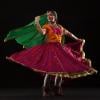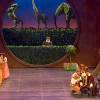
In his 80s, Giuseppe Verdi turned once again to Shakespeare for his last opera, Falstaff. Earlier, he had set Macbeth and, with librettist Arrigo Boito, the great tragedy Othello. But this time they chose a slighter comedy, The Merry Wives of Windsor, shaping it (with additions from Shakespeare’s two Henry IV plays) into a masterpiece of sly subversion and contagious good humor.
In Opera San José’s scintillating production, which opened Saturday and plays through the end of the month, a talented cast of young and ethnically diverse singers brings out Falstaff’s abundant wit as well as its darker subtexts of aging and appetite.
In Shakespeare as in Verdi, Sir John Falstaff is a force of rambunctious disorder. Old, overweight, and short of money, he refuses to tame his appetites for wine and women; he revels in the size of his belly and his supposed sexual appeal. Predictably, he overreaches himself, simultaneously courting two women at once. They see through him immediately and catch him out — frustrating his desires and humiliating him, once in a basket of dirty laundry and, at the end, in a spooky forest at midnight. Like Wile E. Coyote, Falstaff bounces back with renewed energy and laughter.

As Falstaff, baritone Darren Lekeith Drone made a spectacular OSJ debut. The role is usually the province of older singers, but Drone, with his expressive face, comic timing, and ready laughter, conveyed the unrepentant energy of the aging Falstaff. His rounded voice is nimble and expressive — here ranging from insinuating to pompous, overbearing, and disconsolate. Falstaff’s disreputable hangers-on, pompous Pistola and red-nosed Bardolfo, were portrayed with broad humor by (respectively) bass-baritone Andrew Allan Hiers and tenor Marc Molomot.
Like all great comic figures, the larger-than-life Falstaff embodies (literally) a critique of ordered, reasonable life, bringing potential chaos into Windsor’s ostensibly stable families. Opposing him are two friends, Alice Ford (the splendid soprano Chanáe Curtis) and Meg Page (the engaging mezzo-soprano Shanley Horvitz), who join with Mistress Quickly (contralto Megan Esther Grey as a gleefully insinuating go-between) to unravel Falstaff’s deceptions and expose him as a predator and a fool. They do so with some of the most delightful ensemble singing in opera.
Falstaff is packed with musically and theatrically complex ensemble pieces. Much of the joy of the opera is the interaction of singers and orchestra in these virtuoso scenes, and here conductor Joseph Marcheso kept tabs on it all — especially when nine or 10 soloists were each going their own way, with Verdi’s vibrant orchestration adding layer upon layer of complications.

The women may be, as in Shakespeare’s title, “merry,” but there are darker issues. Alice’s husband Ford (robust baritone Eugene Brancoveanu) is consumed with anxieties about his wife’s fidelity and hopes to brutally shame her by bribing Falstaff to seduce her. While the plot does not succeed (the two are implausibly reconciled by the end of Act 2), Ford’s jealousy resonates through the drama, especially in his Act 2 aria of jealousy and revenge, as lurid as any in Verdi’s tragic operas.
Alice feels the effects of her husband’s anxieties. Their impact was powerfully conveyed by Curtis as she read aloud Falstaff’s seduction letter; he offers her “un amor ridente” (a happy love) — something she clearly does not find with Ford. Curtis has sung other tragic women (such as Violetta in Verdi’s La traviata and Nedda in Ruggero Leoncavallo’s I Pagliacci); I hope someday to hear her again as the unhappy Countess in Mozart’s Le nozze di Figaro, a role Verdi surely had in mind as he wrote Falstaff.
Another subplot pits Ford against his daughter Nannetta. Although he wants her to marry rich old Doctor Caius (tenor Zhengyi Bai as an appropriately comic foil), Nannetta and Alice outsmart Ford to scheme a marriage to her lover Fenton. In Act 1, these two lovers join in a romantic duet that brings some calm to the frenetic pace of the rest of the action. Natalia Santaliz’s silvery soprano as Nannetta sweetly counterpointed with Jonghyun Park’s expressive tenor as Fenton.

The appealing stage direction is by José Maria Condemi, based on his production from 10 years ago. The action swirls around inside a vast wine barrel — the visual symbol of Falstaff’s unrelenting appetites as well as the creative ferment of the women who merrily put a lid on the old lecher.
Performed in San José’s beautiful California Theatre, Falstaff continues its run with four more performances through Feb. 26. Don’t miss it.




